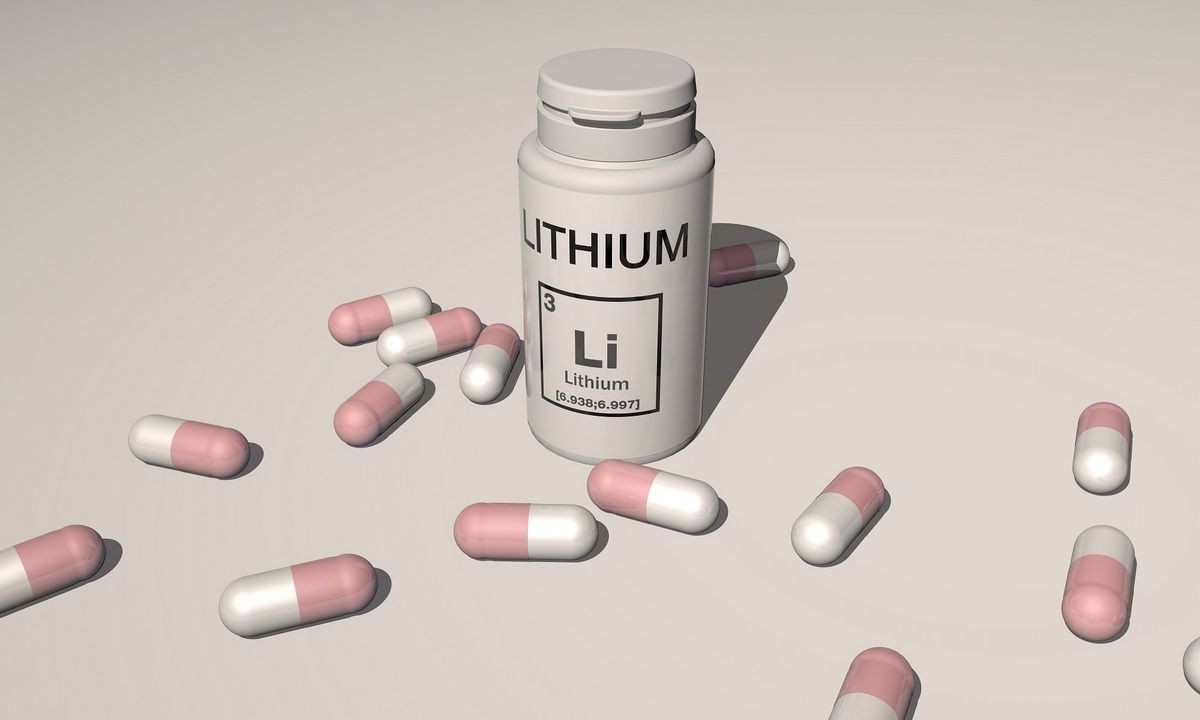
Lithium is used to treat manic/depressive (bipolar) and depressive disorders. It is a positively charged element similar to sodium and potassium, and it interferes with other positively charged atoms like sodium, potassium, calcium, and magnesium inside cells and on the cell surface.
Lithium affects the production and uptake of neurotransmitters, which are chemical messengers that allow nerves to communicate with each other. It also impacts the concentrations of tryptophan and serotonin in the brain, and increases the production of white blood cells in the bone marrow. The effects of lithium typically begin within 1 week of starting treatment, and reach their full effect within 2 to 3 weeks.
- Lithium is used to treat manic episodes in bipolar disorder.
- It is also combined with antidepressants to treat depression.
Lithium has been in use since the 1950s. The FDA approved lithium carbonate, the most common lithium preparation, in 1970.
Contents
Side Effects of Lithium
WARNING
Lithium toxicity can occur at doses close to therapeutic concentrations. Facilities for prompt and accurate serum lithium determinations should be available before initiating therapy.
Common side effects
The most common side effects of lithium include:
- Fine hand tremor
- Dry mouth
- Altered taste perception
- Headache
- Decreased memory
- Confusion
- Muscle weakness
- Weight gain
- Increased thirst
- Increased frequency of urination
- Mild nausea or vomiting
- Impotence
- Decreased libido
- Diarrhea
- Kidney abnormalities
Many gastrointestinal side effects often disappear with continued therapy, especially if lithium is taken in divided doses with meals. Dehydration resulting from diarrhea or excessive urination can lead to lithium toxicity. Lithium can also cause changes in the electrocardiogram (EKG, ECG), low blood pressure, and decreased heart rate.
Dosage for Lithium
- Doses vary based on blood levels of lithium. Recommended levels are 0.6-1.2 mEq/L
- Dose adjustments are made frequently at the beginning of treatment to establish the correct dose.
- Patients usually require 900-2400 mg daily in 2-4 divided doses.
- Patients with kidney disease may require lower doses.
Drug Interactions with Lithium
- Nonsteroidal anti-inflammatory drugs (NSAIDs) can increase lithium levels in the blood and lead to side effects. Blood concentrations of lithium may need to be monitored when starting or stopping an NSAID.
- Diuretics can affect lithium levels in different ways depending on the type of diuretic.
- ACE inhibitors may increase the risk of lithium toxicity.
- Combining lithium with certain antidepressants or MAOI class of antidepressants can lead to serious reactions.
- Medications that make urine alkaline can reduce blood lithium levels.
- Caffeine can reduce serum lithium concentrations.
- Beta blockers may interact with lithium and cause a slow heart rate.
Pregnancy and Breastfeeding
- Lithium crosses the placenta and has been associated with toxicity in the fetus. Women who may require lithium should be counseled about becoming pregnant and lithium should ideally be withheld during the first trimester.
- Lithium is secreted into breast milk and can cause symptoms of lithium toxicity in breastfed infants.
Other Information about Lithium
Available Preparations
- Tablets: 300 mg
- Tablets (extended release): 300 and 450 mg
- Capsules: 150, 300, and 600 mg
- Syrup: 300 mg/5 ml
Storage
All lithium formulations should be stored at room temperature, 15 C to 30 C (59 F to 86 F).
Summary
Lithium is used for the treatment of manic/depressive (bipolar) and depressive disorders. It interferes with the production and uptake of neurotransmitters and affects the concentrations of tryptophan and serotonin in the brain. In addition, it increases the production of white blood cells in the bone marrow.


